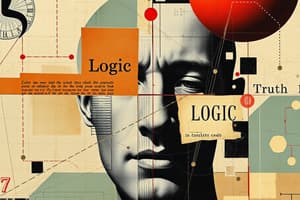Podcast
Questions and Answers
What is the primary focus of the treatise 'Prior Analytics'?
What is the primary focus of the treatise 'Prior Analytics'?
- The account of fallacious reasoning
- The principles of inference (correct)
- The logical analysis of science
- The method of reasoning in philosophical questions
Which treatise addresses the method of reasoning when demonstrative proof is unavailable?
Which treatise addresses the method of reasoning when demonstrative proof is unavailable?
- Topics (correct)
- De Interpretatione
- Posterior Analytics
- Sophistical Refutations
What concept does the term 'logike' refer to in Ancient Greek?
What concept does the term 'logike' refer to in Ancient Greek?
- The art of persuasion
- The study of fallacies
- The analysis of scientific arguments
- The study of valid reasoning (correct)
Which of the following best encapsulates what logic is described as in the content?
Which of the following best encapsulates what logic is described as in the content?
What is the subject matter of the treatise 'Sophistical Refutations'?
What is the subject matter of the treatise 'Sophistical Refutations'?
What is the primary focus of the process of logic?
What is the primary focus of the process of logic?
What can be inferred about the criteria for thinking in logic?
What can be inferred about the criteria for thinking in logic?
Which type of logic is characterized by drawing conclusions from the general to the specific?
Which type of logic is characterized by drawing conclusions from the general to the specific?
How does inductive logic differ from deductive logic?
How does inductive logic differ from deductive logic?
What aspect does formal logic primarily concern itself with?
What aspect does formal logic primarily concern itself with?
What role does conformity with reality play in logical reasoning?
What role does conformity with reality play in logical reasoning?
Which of the following processes is most closely associated with the scientific method in logical reasoning?
Which of the following processes is most closely associated with the scientific method in logical reasoning?
What is a common misconception regarding the truth in logical reasoning?
What is a common misconception regarding the truth in logical reasoning?
Flashcards are hidden until you start studying
Study Notes
Categories of Logic
- The ten primary classes categorize our concepts of things.
- Key works include "The Categories," "De Interpretatione," "Prior Analytics," "Posterior Analytics," "Topics," and "Sophistical Refutations."
- "De Interpretatione" focuses on terms and propositions.
- "Prior Analytics" examines inference methods.
- "Posterior Analytics" analyzes the logical structure of science.
- "Topics" addresses reasoning methods for philosophical questions without demonstrative proof.
- "Sophistical Refutations" discusses fallacious reasoning and how to evaluate arguments.
Definitions of Logic
- Nominal Definition: Derived from Ancient Greek λογική (logike), it involves the use and study of valid reasoning.
- Real Definition: Logic is the study of reasoning principles, emphasizing proposition structure over content, and the validity of deductive reasoning.
- Logic comprises principles, methods, and laws guiding the mind towards valid arguments.
- W. Stanley Jevons states that logic is the science and art of correct thinking.
Elements in the Definition of Logic
- Logic evaluates arguments to distinguish truth from falsehood and reasonable beliefs from unreasonable ones.
- Two criteria for the mental process considered thinking:
- Drawing conclusions from known data.
- Following the right procedures in reasoning.
- Logic focuses on correct thinking operations rather than the absolute truth of data.
Types of Logic
- Valid reasoning focuses on whether arguments conform to existing logical standards.
- The structural approach examines how reasoning is built for soundness.
- Formal Deductive Logic: Involves arguments flowing from specific premises to general conclusions, implying a degree of probability.
- Inductive Logic: Moves from general principles to specific instances, closely tied to the scientific method, which compels generalization from observations to theories.
Studying That Suits You
Use AI to generate personalized quizzes and flashcards to suit your learning preferences.




